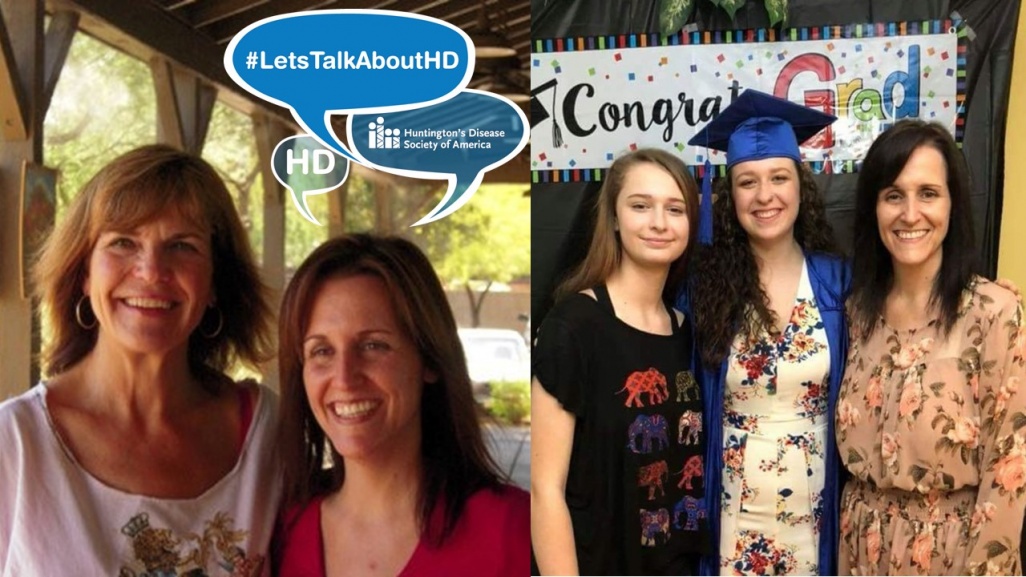
By Matthew Santamaria (msantamaria@hdsa.org)
Georgia resident Whitney LeVerne Chandler has seen firsthand the problems that her mother, Sammie, has dealt with. Whitney’s mother went from working at the Daily Times Newspaper in Georgia to becoming homeless with symptoms of Huntington’s disease (HD).
HD is a fatal genetic disorder that causes the progressive breakdown of nerve cells in the brain. It deteriorates a person’s physical and mental abilities usually during their prime working years and has no cure.
The disease is described as having ALS, Parkinson’s and Alzheimer’s diseases – simultaneously. Symptoms include personality changes, mood swings, depression, forgetfulness, impaired judgement, unsteady gait, involuntary movements, slurred speech, difficulty in swallowing, and significant weight loss.
Sammie was working as a secretary for the Editor at the Daily Times and raising two children. According to Whitney, she was an amazing person and mother that would cry during commercials and Hallmark movies. However, she started to cut herself and make mistakes at the workplace. She was eventually let go of her job.
In 1993, the same year the HD gene was discovered, Sammie was tested for the disease.
The decision to get genetically tested is difficult to make. Each year, 5-10% are tested. It is never the right or wrong decision to be tested. There are people that see no benefit in knowing that they will develop the disease while others want to know in order to make informed choices about their future. It can take up to several weeks to receive your results from the genetic testing center.
She tested positive for HD. Once she found out, her smoking increased. She did not want her family controlling her as she ran away from home and became homeless. The symptoms took over Sammie.
With all the symptoms taking over her mother’s life, Whitney was never afraid of her mother. Eventually, they would be reunited with her and wanted to place her in a nursing home. Whitney has worked in a nursing home and wanted to make sure her mother was properly taken care of. She was in a nursing home for more than ten years and passed away at the age of 72-years-old.
As for Whitney, she knew that she was at risk for HD. Every child of a parent with HD has a 50/50 chance of inheriting the faulty gene that causes Huntington’s disease. Whitney would test positive for HD. She has two daughters at risk.

According to Whitney, she is a shell of herself. She is a homeschool mom, owned her own hair salon, and loves learning. She is currently in the disability process.
On HDSA Disability Chat, HDSA’s Manager of Disability Programs Allison Bartlett (abartlett@hdsa.org) talks in-depth about what the HD Community should know about Social Security Disability. To view videos, click here
“The Social Security disability application is complicated, and, for many individuals, overwhelming,” Allison explains. “Also, many individuals do not provide enough detail or information in their disability application about their HD symptoms and how their symptoms impact them every day. They assume Social Security will gather that information, which is an incorrect assumption. Social Security will request medical records, but it is the individual’s responsibility to inform Social Security of their symptoms and struggles, and make sure Social Security gets the records from the right doctors, which should include a treating neurologist.”

###
Huntington’s disease is a fatal genetic disorder that causes the progressive breakdown of nerve cells in the brain. It deteriorates a person’s physical and mental abilities usually during their prime working years and has no cure. Every child of a parent with HD has a 50/50 chance of inheriting the faulty gene that causes Huntington’s disease. Today, there are approximately 41,000 symptomatic Americans and 200,000 at-risk of inheriting the disease. In less than 10% of cases, juvenile Huntington’s disease (JHD) affects children & adolescents. JHD usually has a more rapid progression rate than adult onset HD; the earlier the onset, the faster JHD progresses. HD is described as having ALS, Parkinson’s and Alzheimer’s diseases – simultaneously. HD is characterized by a triad of symptoms, including progressive motor dysfunction, behavioral disturbance and cognitive decline.
The Huntington’s Disease Society of America is the premier nonprofit organization dedicated to improving the lives of everyone affected by HD. From community services and education to advocacy and research, HDSA is the world’s leader in providing help for today and hope for tomorrow for people with HD and their families.
To learn more about Huntington’s disease and the work of the Huntington’s Disease Society of America, visit www.HDSA.org or call 1(800)345-HDSA.
This is a story featuring a personal experience with Huntington’s disease. If you would like to have your story told please contact Matthew Santamaria at msantamaria@hdsa.org
Georgia resident Whitney LeVerne Chandler has seen firsthand the problems that her mother, Sammie, has dealt with. Whitney’s mother went from working at the Daily Times Newspaper in Georgia to becoming homeless with symptoms of Huntington’s disease (HD).
HD is a fatal genetic disorder that causes the progressive breakdown of nerve cells in the brain. It deteriorates a person’s physical and mental abilities usually during their prime working years and has no cure.
The disease is described as having ALS, Parkinson’s and Alzheimer’s diseases – simultaneously. Symptoms include personality changes, mood swings, depression, forgetfulness, impaired judgement, unsteady gait, involuntary movements, slurred speech, difficulty in swallowing, and significant weight loss.
Sammie was working as a secretary for the Editor at the Daily Times and raising two children. According to Whitney, she was an amazing person and mother that would cry during commercials and Hallmark movies. However, she started to cut herself and make mistakes at the workplace. She was eventually let go of her job.
In 1993, the same year the HD gene was discovered, Sammie was tested for the disease.
The decision to get genetically tested is difficult to make. Each year, 5-10% are tested. It is never the right or wrong decision to be tested. There are people that see no benefit in knowing that they will develop the disease while others want to know in order to make informed choices about their future. It can take up to several weeks to receive your results from the genetic testing center.
She tested positive for HD. Once she found out, her smoking increased. She did not want her family controlling her as she ran away from home and became homeless. The symptoms took over Sammie.
With all the symptoms taking over her mother’s life, Whitney was never afraid of her mother. Eventually, they would be reunited with her and wanted to place her in a nursing home. Whitney has worked in a nursing home and wanted to make sure her mother was properly taken care of. She was in a nursing home for more than ten years and passed away at the age of 72-years-old.
As for Whitney, she knew that she was at risk for HD. Every child of a parent with HD has a 50/50 chance of inheriting the faulty gene that causes Huntington’s disease. Whitney would test positive for HD. She has two daughters at risk.

According to Whitney, she is a shell of herself. She is a homeschool mom, owned her own hair salon, and loves learning. She is currently in the disability process.
On HDSA Disability Chat, HDSA’s Manager of Disability Programs Allison Bartlett (abartlett@hdsa.org) talks in-depth about what the HD Community should know about Social Security Disability. To view videos, click here
“The Social Security disability application is complicated, and, for many individuals, overwhelming,” Allison explains. “Also, many individuals do not provide enough detail or information in their disability application about their HD symptoms and how their symptoms impact them every day. They assume Social Security will gather that information, which is an incorrect assumption. Social Security will request medical records, but it is the individual’s responsibility to inform Social Security of their symptoms and struggles, and make sure Social Security gets the records from the right doctors, which should include a treating neurologist.”

Whitney has a message for the HD Community:
“Don’t stop fighting and do not hide the disease. We need to be more educated about HD.”
“Don’t stop fighting and do not hide the disease. We need to be more educated about HD.”
###
Huntington’s disease is a fatal genetic disorder that causes the progressive breakdown of nerve cells in the brain. It deteriorates a person’s physical and mental abilities usually during their prime working years and has no cure. Every child of a parent with HD has a 50/50 chance of inheriting the faulty gene that causes Huntington’s disease. Today, there are approximately 41,000 symptomatic Americans and 200,000 at-risk of inheriting the disease. In less than 10% of cases, juvenile Huntington’s disease (JHD) affects children & adolescents. JHD usually has a more rapid progression rate than adult onset HD; the earlier the onset, the faster JHD progresses. HD is described as having ALS, Parkinson’s and Alzheimer’s diseases – simultaneously. HD is characterized by a triad of symptoms, including progressive motor dysfunction, behavioral disturbance and cognitive decline.
The Huntington’s Disease Society of America is the premier nonprofit organization dedicated to improving the lives of everyone affected by HD. From community services and education to advocacy and research, HDSA is the world’s leader in providing help for today and hope for tomorrow for people with HD and their families.
To learn more about Huntington’s disease and the work of the Huntington’s Disease Society of America, visit www.HDSA.org or call 1(800)345-HDSA.
This is a story featuring a personal experience with Huntington’s disease. If you would like to have your story told please contact Matthew Santamaria at msantamaria@hdsa.org
